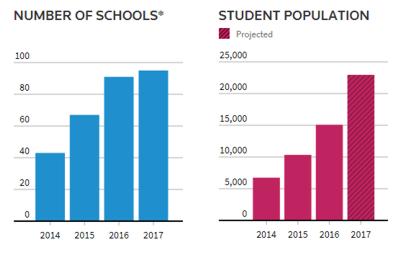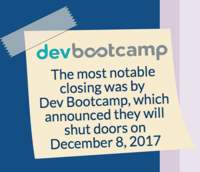| Are Developer Bootcamps Dying Out? |
| Written by Janet Swift |
| Wednesday, 16 August 2017 |
|
The announcement of the impending closure of Dev Bootcamp, and news that The Iron Yard had already stopped accepting new registrations has led to some speculation about the demise of coding bootcamps in general. The statistics tell a very different story. Source: Reuters It is clear from this pair of charts that coding bootcamps are far declining, especially in terms of numbers of students. The data comes from Course Report which is devoted to keeping tabs on the coding bootcamp industry. According to its long term research the number of coding bootcamp graduates has grown 10x since the first bootcamps launched in 2012. Moreover in 2017 the bootcamp market will grow by 1.5x, to an estimated 22,949 graduates in 2017, up from 15,077 in 2016. This infographic from Course Report not only reveals the growth of bootcamps since 2013, it shows their geographic expansion. It also reveals that average length of a bootcamp is three and a half months and the average cost works out at almost $1000 per week. Full Stack Javascript is the most popular course followed by Ruby on Rails. Another finding is that in 2017, the number of bootcamp providers has grown to 95, compared to 91 last year and in its final frame it looks at "natural consolidation" where it notes recent rebrandings and acquisitions and closures. Neither The Iron Yard nor Dev Bootcamp are taken into account in these figures which brings the total of closures up to eight.
What is instructive is to look at why Dev Bootcamp, which had six campuses (San Francisco, Chigago, San Diego, Austin, Seatlle and New York City, has withdrawn from what seems like a buoyant market. It could be argued that it was a victim of its own success. Soon after it was launched in 2012, offering intensive courses in JavaScript and Ruby, it led to competitors such as Hack Reactor, Hackbright and App Academy, some founded by its own graduates. One thing that Dev Bootcamp and the Iron Yard had in common is that they were acquired by bigger businesses. Kaplan Inc bought Dev Bootcamp in 2014 and Apollo Education Group, which operates the University of Phoenix, took over The Iron Yard, which offered courses in 22 cities, in 2015. In both cases the reason to cease operations was the inability to make sufficient profit. The statement made by Dev Bootcamp was that it could not: "find a viable business model ... [to cover] the critical day-to-day costs of running out campuses" A similar message came from The Iron Yard: "In considering the current environment, the board has made the difficult decision to cease operations at all campuses after teaching out remaining summer cohorts." The current environment sees competition for the the Coding Bootcamp model in more that one direction. There's a sustained increase in the number of undergraduate students choosing Computer Science on the one hand, costing students up to $20,000 per semester for typically 3 years and MOOC providers offering courses you can fit into your spare time for an outlay of less than $2,000. While some bootcamps, for example General Assembly, are looking to the corporate market for future stability, this is a limited option. Even so we are far from a situation in while this model of intensive, in-person, training is going to disappear.
More Information Related ArticlesFree Code Camp - Not Just A Bootcamp Students Flocking to Computer Science Computer Science Enrollments On The Up $1.19 Million Study of Impact of Pre-College Computing Obama Unveils Computer Science for All Computer Science Officially US STEM Subject
To be informed about new articles on I Programmer, sign up for our weekly newsletter, subscribe to the RSS feed and follow us on Twitter, Facebook or Linkedin.
Comments
or email your comment to: comments@i-programmer.info |
| Last Updated ( Wednesday, 16 August 2017 ) |




